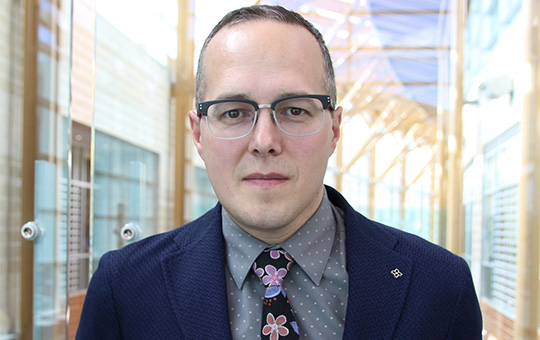'Young people deserve to be well': A Canadian mental health expert is using Indigenous-led research to improve the lives of youth across the country

If we are remembered for the tracks that we leave, you could say Dr. Christopher Mushquash is forging an important path to transform Indigenous mental health in Canada.
"I feel compelled to be among the many people who are working to advocate for Indigenous youth, improve their wellness and ensure that our communities and our cultures are in the conversation and have a permanent place at the table," says Dr. Mushquash, a registered clinical psychologist, Canada Research Chair in Indigenous Mental Health and Addiction, professor in the department of psychology at Lakehead University and at the Northern Ontario School of Medicine University, director of Lakehead University's Centre for Rural & Northern Health Research, vice-president of research at Thunder Bay Regional Health Sciences Centre and the chief scientist at the Thunder Bay Regional Health Research Institute.
Along with his impressive professional achievements, Dr. Mushquash, who is Ojibway and a member of the Pays Plat First Nation about 175 kilometres northeast of Thunder Bay, is grounded in his cultural roots and knowledge. It's what ignites his passion to make a difference.
"I grew up in a rural northern Ontario town surrounded by trees and bush and it was a good town to grow up in, but mental health and substance use difficulties were visible," he explains. "Those problems weren't hypothetical, we had first-hand experience. As I grew older, I began to learn more about how issues develop and what it may take to improve them. It's why I've devoted so much of my life to helping Indigenous youth."
Improving health equity in Indigenous communities
His most recent project, Developing context-specific and culturally relevant wise practices for transforming youth mental health services in Indigenous contexts is funded by the Canadian Institutes of Health Research (CIHR) via the Integrated Youth Services Network of Networks initiative. As co-principal investigators, Dr. Mushquash and Dr. Srividya Iyer, a professor at McGill University's department of psychiatry, are leading a team of researchers with the ACCESS Open Minds (ACCESS OM) Indigenous Council. ACCESS OM, launched in 2014, was one of the first initiatives studying Integrated Youth Services (IYS), a one-stop shop for youth support services in Canada. The Indigenous Council comprises a group of key stakeholders from each of the six Indigenous community partners – Elsipogtog First Nation (N.B.), Eskasoni First Nation (N.S.), Sturgeon Lake First Nation (Sask.), Purvirnituq (Nunavik, Que.) Aaschihkuwaataauch (Mistissini, Que.) and Ulukhaktok (Inuvialuit Settlement Region, N.W.T.).
The project will examine how youth mental health services are delivered in dozens of Indigenous communities across the country. The team will then study those data and make recommendations – through consultations with youth, families and key stakeholders – on how those successful wellness services can be implemented at IYS hubs across Canada in hopes of helping more Indigenous youth.
"It's not about redesigning the system from scratch, it's about looking at what works for Indigenous youth and disseminating that information more broadly," says Dr. Mushquash.
"There are important cultural differences between various Indigenous groups in Canada. Some speak different languages, some have different cultural practices and spiritual beliefs. The one thing we do have in common is the shared history of the colonial imposition, the disconnection from land and the residential school legacy. Communities also face similar issues in mental health and addiction."
He says treatments and solutions that may work in one part of the country could be beneficial to youth thousands of kilometres away. "There may be an approach to reducing precarious housing for youth in Thunder Bay that may also work in the Yukon. The two areas may be able to share best practices. That is the kind of knowledge-sharing this project will promote."
A cycle of continuous improvement
Projects like this will then share results through a Learning Health System (LHS). The LHS model is centred around a team of researchers and scientists, like Dr. Mushquash, who use embedded data collection to study all kinds of youth wellness services, from mental health to peer support and work study programs. The team looks at what treatments and supports work best and why That information is then used to tailor and improve treatments and services at IYS hubs across the country.
"Young people deserve to be well, and they deserve high quality treatments," he adds. "They should be part of the conversations to find out exactly what they need. When you bring those two philosophies together you get this incredible learning health system."
Dr. Mushquash believes an investment in Indigenous-led research is an investment in the future of Canadian youth.
"There is a tremendous amount of promise, hopefulness and resilience in our First Nations, Inuit and Métis communities," Dr. Mushquash adds. "Indigenous youth, and all youth for that matter, need support around them when they need it, so they can go forward and have the life that they deserve. It's our responsibility to ensure those opportunities are there."
- Date modified: